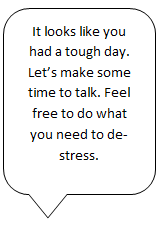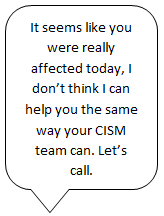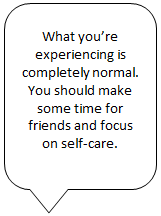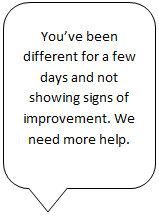Tips for opening discussion
If a friend or partner has experienced a traumatic event, your behaviour may help the recovery process. Here are some suggestions:
Learn about critical incident stress so you can begin to understand what the person is experiencing.
Encourage the individual to talk about the incident, but don’t be overly demanding. They may feel that others don’t want to hear about their feelings or that you expect them to be able to “handle” the situation. You need to challenge these beliefs by indicating your willingness to listen.
Ask “How are you doing?” or “How are you feeling?” If people want to talk they will; if not, they won’t. By your questions, you have at least sent the message that a listening ear is available.
Don’t be afraid of deep emotion. Many of us have not experienced profound grief or anguish. Seeing someone cry uncontrollably can be somewhat distressing. Traumatized individuals need to vent their emotions and if they are in your presence, they need your support. Simply be there to listen and let them talk. Afterwards, suggest a walk to help them further reduce their level of stress.
Share your feelings about the situation. Don’t say “I know how you feel,” because you don’t. You may have gone through a similar experience, but no two experiences are the same or perceived as being the same. You can, however, say things like “I can imagine this must hurt a lot” or “I feel sorry for what has happened.”
Don’t make false promises such as “everything will be okay.” No one knows the future. Your role is that of a support person, not a miracle worker. If you don’t know what to say, say nothing. In most cases, all people need is someone to “hear them out,” not necessarily to solve their problems.
Say “it’s okay for you to feel the way you do.” Affirm that there has been a terrible tragedy and that it is normal to feel pain, confusion, etc. Such a statement is particularly reassuring if you are a peer. It is helpful to have co-workers legitimize your feelings.
Do not explain away anything. At this stage, your explanation is not needed; emotional release is. Your explanation may be interpreted as minimizing rather than supporting the individual’s feelings.
Encourage a subsequent debriefing or counselling session if the pain persists. Guidelines are difficult to provide. However, the situation should improve one week to next. Indications of progress include hearing comments such as “Yeah, I’m feeling better today,” seeing less stress and strain on the individual or seeing the individual become more like his/her former self.
Take care of yourself; you are a co-survivor. Though not involved in the incident, you are a victim of the by-product of the incident. Make sure there is someone with whom you can talk things out.
Source: Critical Incident Stress Management (CISM) Program, Canada Border Services Agency - Pacific Region: CISM Mass Event Response Plan 2006 (PDF)




